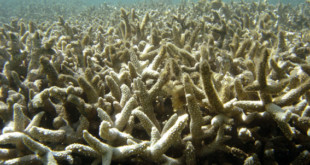Some fish may cope with the changing chemistry of the oceans linked to global warming by permanently setting their body defences to night-time levels, the time of day when they find seawater least hospitable, a study says. Man-made carbon dioxide, released into the air by burning fossil fuels, forms a weak …
August, 2016
-
2 August
Antarctic sea ice may be source of mercury in Southern Ocean fish and birds
New research has found methylmercury — a potent neurotoxin — in sea ice in the Southern Ocean. Published today in the journal Nature Microbiology, the results are the first to show that sea-ice bacteria can change mercury into methylmercury, a more toxic form that can contaminate the marine environment, including fish …
July, 2016
-
27 July
First evidence of ocean acidification’s impact on reproductive behavior in wild fish
Ocean acidification could have a major impact on the reproductive behaviour of fish living in affected waters, a new study shows. Research conducted close to volcanic vents off the coast of Southern Italy demonstrated marked reproductive differences in species of ocellated wrasse (Symphodus ocellatus)…
-
26 July
Hidden in your daily facial scrub: Up to 94,500 tiny microbeads which are deadly to marine life
Facial scrubs are used daily by millions of people to exfoliate their skin – but scientists have exposed the tiny toxic plastic beads hidden in the products. Each wash contains up to 94,500 microbeads, while one tube comprises up to 2.8million of the beads, which experts at Plymouth University extracted…
-
26 July
Isolated coral reefs far from human activity are not healthier
For the world’s coral reefs, the picture keeps getting gloomier. Although it’s widely assumed that both local and global factors are contributing to their decline, new research from the University of North Carolina at Chapel Hill shows that isolated reefs far from human activities are in fact not healthier than …
-
21 July
Sections of Great Barrier Reef suffering from ‘complete ecosystem collapse’
“Complete ecosystem collapse” is being seen on parts of the Great Barrier Reef, as fish numbers tumble and surviving corals continue to bleach into winter, according to a scientist returning from one of the worst-hit areas. “The lack of fish was the most shocking thing,” said Justin Marshall, of the University …
-
20 July
A new power plant could devastate the world’s largest mangrove forest
The planet’s largest mangrove forest could be facing serious trouble in the form of two new coal-fired power plants, environmentalists say — and they’re urging the United Nations to draw greater attention to the issue. The Sundarbans include a region spanning thousands of square miles of land and water in …
-
19 July
Researcher says warmer waters in Nova Scotia ‘ocean hotspot’ killing off kelp forests
Once rich forests of willowy kelp that stretch along Nova Scotia’s coast have been decimated by warming water temperatures, says a marine biologist who warns that the loss could harm other species that rely on them for food. Karen Filbee-Dexter of Dalhousie University in Halifax said Thursday that over the last …
-
15 July
New UN-backed survey reveals ‘alarming’ damage to high seas and marine ecosystems
More than half of the world’s fragile coral reefs are under threat and most of our major fish stocks are now overexploited, according to the latest global assessments on the state of world’s high seas and large marine ecosystems launched today by United Nations Educational, Scientific and Cultural Organization (UNESCO)’s …
-
15 July
Ocean warming to blame for Antarctic Peninsula glacier retreat
For the first time, research has established ocean warming as the primary cause of glacial retreat on the western Antarctic Peninsula. The meltwater runoff from shrinking glaciers on the Antarctic Peninsula is accelerating sea level rise. But until now, scientists thought warming air temperatures were the main driver…
-
14 July
Closing parts of the ocean to fishing not enough to protect marine ecosystems
A University of Washington fisheries professor argues this week that saving biodiversity in the world’s oceans requires more than banning fishing with marine protected areas, or oceanic wilderness areas. In a three-page editorial published this week in the journal Nature, he argues that this increasingly popular conservation strategy is not …
-
13 July
Weathered oil in Gulf of Mexico may threaten development of fish embryos and larvae
The Deepwater Horizon (DWH) oil spill, in which nearly three million barrels of crude oil got released in 2010 into the northern Gulf of Mexico, contaminated the spawning habitats for many fishes. A research team has now found that ultraviolet light is changing the structure of the DWH oil components …
 Ocean Sentry
Ocean Sentry










